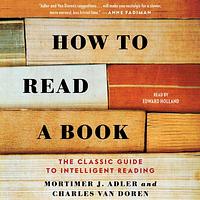Take a photo of a barcode or cover
542 reviews for:
How to Read a Book: The Classic Guide to Intelligent Reading
Mortimer J. Adler, Charles Van Doren
542 reviews for:
How to Read a Book: The Classic Guide to Intelligent Reading
Mortimer J. Adler, Charles Van Doren
I mostly just picked it up as a joke book. Wasn't really interesting. While skimming I noticed the points were very similar to my technical writing class: read the intro, read the summary, skim through it once, then skim through again in detail researching anything you don't understand (which is incidentally how I read this book). I didn't see much about how to apply this to fiction though.
This is probably one of the most helpful books I've ever read. I first heard about this book several years ago, and have been intending to read it since then, but never made the time. I am so thankful that I finally have completed this journey. Though not an easy read, nor really a fun one, I do believe it will impact my reading for years to come. Definitely recommended reading for ANYONE who desires to read a lot, but particularly recommended for someone who desires to read WELL, and to read books that will truly make a lasting impact on your life. I'm sure I will return to this book again in the future.
informative
This is a great book about books. It provides a method to reading non-fiction works mainly, although it also covers the reading of fiction to a lesser extent. The book presents a set of principles and rules to follow in order to extract the most out of books that are worth your while. It is, as the authors say, not a method to be applied to all books, but only to those who deserve some good analytical reading, as opposed to others you can just speedread.
I’m not going to criticise this book in this commentary (not yet at least), because I intent to apply what the authors propose to a few books – then I’ll come back to this review. As the authors propose – one can only fairly judge a practical book once one has tried to apply what it proposes. But I did like what I read and what I learned from How to read a book. I give it four stars!
I’m not going to criticise this book in this commentary (not yet at least), because I intent to apply what the authors propose to a few books – then I’ll come back to this review. As the authors propose – one can only fairly judge a practical book once one has tried to apply what it proposes. But I did like what I read and what I learned from How to read a book. I give it four stars!
Difficult to read, yes, but very worth reading. It has changed how i read and i recommend it to anyone keen to get more out of books than they were taught at school.
Extremely tedious and while containing some good advice, definitely could have been elucidated much, much better using point form/article form. Like another review said, someone should have told Adler on How To Write A Book. Use the time to read a better book instead.
informative
slow-paced
This book contains some good advice on how to better analyze nonfiction, and some mediocre advice on how to better analyze fiction. I won't say this was what I was looking for or particularly easy to get through, but it was somewhat helpful, and I had fun with the reading exercises at the end (I love tests, sue me).
Read in preparation for seminary. Great tools if you need to read many books for research, found only the last section super helpful as I already knew the bulk of what the author was trying to teach.
I appreciate some of the dialectical reductions and clarifications on display, but this guide just isn't really applicable to most people. The most important parts of this book relate to how to read expository works and then builds on that into synoptical reading.
So basically this is primarily a guide on how best to research for a paper or video essay, or something. I think it offers a useful paradigm for that use case though!
The structure and writing of this book is really loose and verbose. He kind of just moves conversationally from one point to the next. Each section states it's entire thesis in the first paragraph, then spends several pages rambling about it. I'm glad he mentioned the value of skimming early on lol.
So basically this is primarily a guide on how best to research for a paper or video essay, or something. I think it offers a useful paradigm for that use case though!
The structure and writing of this book is really loose and verbose. He kind of just moves conversationally from one point to the next. Each section states it's entire thesis in the first paragraph, then spends several pages rambling about it. I'm glad he mentioned the value of skimming early on lol.


